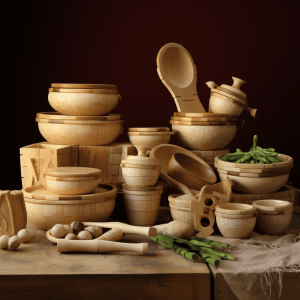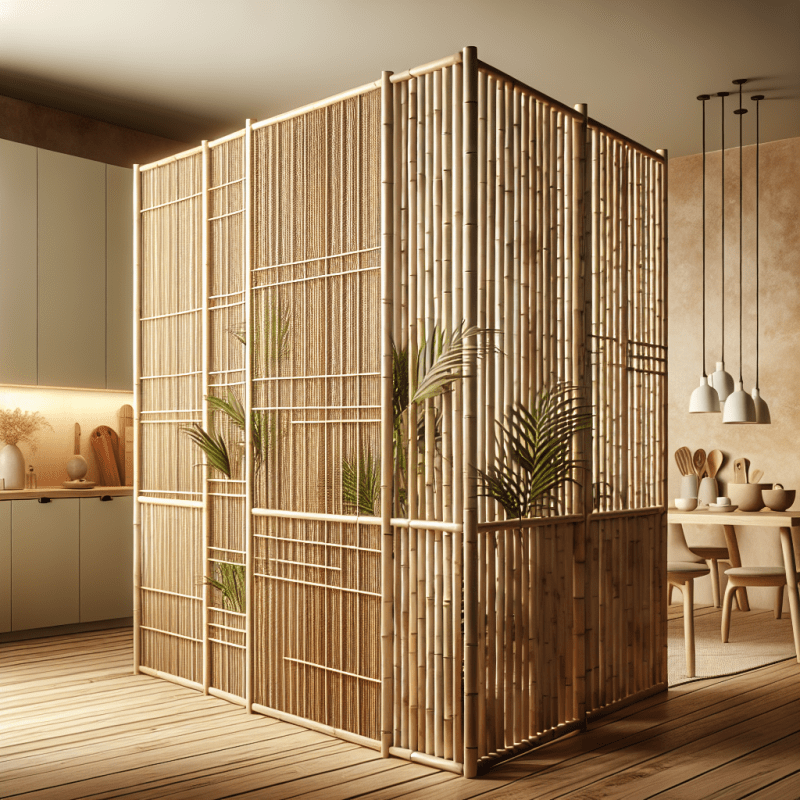Bamboo, once considered a humble plant found in forests, has now risen to become a central fixture in kitchens around the world. This versatile material has made its way into various culinary tools, utensils, and even household products due to its unique properties and eco-friendly nature.
With a history dating back thousands of years, bamboo has been an essential resource in many cultures. Initially used primarily for building, bamboo's qualities as a durable and flexible material were soon recognized by chefs and artisans. As time went on, people discovered that bamboo possesses natural antibacterial properties, making it an ideal material for kitchen tools and cutting boards.
Today, bamboo has gained global recognition for its sustainability and versatility in the kitchen. This fast-growing grass is exceptionally eco-friendly, as it requires no fertilizers or pesticides to grow and can reach maturity in just a few years. Chefs and home cooks alike appreciate its light weight, natural resistance to moisture, and heat-resistant qualities, which make it an excellent choice for utensils, bowls, and serving trays.
Why bamboo is taking over kitchens worldwide
Over the years, bamboo has swiftly made its way from being a little-known plant to becoming a central fixture in kitchens worldwide. Its popularity is not without reason – there are several key factors that contribute to bamboo's rise in kitchen products and culinary usage.
Firstly, bamboo is incredibly sustainable and environmentally friendly. This rapidly renewable resource grows at an astonishing rate, making it an ideal choice for eco-conscious individuals. Unlike traditional hardwoods, bamboo forests can replenish themselves within just a few years, making it a more sustainable option for kitchen materials. In addition, its cultivation requires minimal water, pesticides, and fertilizers, further reducing its environmental footprint. With an increasing focus on sustainable living, it's no wonder bamboo is gaining popularity in kitchens.
Secondly, bamboo possesses impressive durability and strength. This natural material has a higher tensile strength than many types of steel and can withstand harsh conditions, making it a reliable choice for kitchen products. Bamboo cutting boards, utensils, and bowls are known for their resistance to knife marks and warping. Furthermore, bamboo's natural antimicrobial properties make it a hygienic option for food preparation surfaces. Its ability to resist moisture and stains adds to the appeal of bamboo kitchen products as they offer long-lasting performance.
Lastly, bamboo imparts a touch of elegance and beauty to any kitchen space. With its light color, fine grain, and smooth texture, bamboo seamlessly blends with various kitchen designs and styles. Whether used for flooring, cabinets, countertops, or even decorative accents, bamboo adds a warm and inviting aesthetic to kitchens worldwide. Its versatility in appearance allows it to create a harmonious and visually appealing atmosphere, making it a popular choice for both modern and traditional kitchen designs.
Sustainable, versatile, and stylish: Bamboo's undeniable allure
In recent years, bamboo has emerged as one of the most sought-after materials in kitchen design, becoming a central fixture in modern households across the globe. Its rise in popularity can be attributed to several factors that make it a truly remarkable choice for homeowners and interior designers alike.
First and foremost, bamboo is widely celebrated for its sustainability. Unlike traditional hardwoods, which can take decades to replenish, bamboo is a fast-growing grass that can be harvested within 3-5 years. Its rapid growth rate makes it a highly renewable resource, perfect for those conscious of their environmental footprint. Furthermore, bamboo can be harvested without causing damage to its root system, ensuring that ecosystems are preserved and biodiversity is maintained.
But bamboo's appeal extends beyond its sustainability credentials. It is an incredibly versatile material that can be used in numerous applications within the kitchen. From cutting boards and countertops to utensils and flooring, bamboo provides a natural, warm, and organic aesthetic that complements a wide range of interior styles. Its light color and subtle grain patterns add a touch of sophistication, creating a timeless beauty that effortlessly adapts to both traditional and contemporary kitchens.
Lastly, bamboo offers impressive durability and resilience. It is known for its strength and sturdiness, capable of withstanding the demands of a bustling kitchen environment. Bamboo products are highly resistant to moisture, stains, and scratches, making them a practical choice for areas prone to spills and heavy usage. Additionally, bamboo's natural antibacterial properties make it a hygienic option for kitchen surfaces, ensuring a safe and healthy food preparation area.
From cutting boards to cabinets: Bamboo's expanding kitchen reign
Bamboo, once primarily known for its use in the construction of flooring and furniture, has now firmly established itself as a central fixture in kitchens around the world. Shifting consumer preferences towards sustainable and eco-friendly materials, combined with bamboo's remarkable versatility and durability, have fueled its global rise as a go-to choice for kitchen essentials.
One of bamboo's most well-known uses in the kitchen is in the form of cutting boards. With its natural resistance to moisture, bamboo cutting boards are not only visually appealing but also highly functional. They provide a durable and hygienic surface for food preparation, making them a staple for both professional chefs and home cooks alike. Furthermore, bamboo's fast-growing nature and ability to regenerate quickly make it an environmentally friendly alternative to traditional wooden cutting boards.
However, bamboo's presence in the kitchen extends far beyond cutting boards. It has gained immense popularity as a material for kitchen cabinets and countertops. Bamboo cabinets offer a sleek and modern aesthetic, adding a touch of natural beauty to any kitchen. Additionally, bamboo's strength and resilience make it a practical choice for cabinetry. With proper care and maintenance, bamboo cabinets can withstand the rigors of everyday use, all while contributing to a sustainable living environment.
Moreover, bamboo has found its way into numerous kitchen utensils, such as spoons, spatulas, and bowls. Its lightweight yet sturdy nature makes it ideal for these items, seamlessly integrating functionality with style. Alongside its eco-friendly qualities, bamboo's natural resistance to bacteria growth further enhances its appeal when it comes to kitchen hygiene.
4.38 out of 5 starsBamboo Cookware
Sustainable and Stylish Cookware to Elevate Your Kitchen Experience
Product information
Product Review Score
Product links


